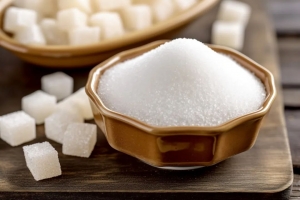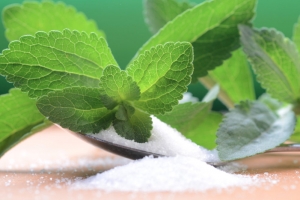Sugar alcohols have been a common substitute for sugar for decades. They look and taste like sugar, but have fewer calories and fewer negative health effects. In fact, many studies have shown that sugar alcohols can improve health.

In this paper, sugar alcohols and their health effects are studied.
What are sugar alcohols?
Sugar alcohols are a class of sweet carbohydrates that are polyols that contain more than two hydroxyl groups.
Since sugar alcohols are partially resistant to digestion, they act like dietary fiber. They are also a FODMAP diet that may cause stomach upset and bloating in some people.
As the name suggests, they are like a mixture of sugar molecules and alcohol molecules.
Despite the "alcohol" component in the name, they do not contain any ethanol, a compound that can make you drunk. Sugar alcohols are safe for people who abuse alcohol.
Fruits and vegetables contain several sugar alcohols.
However, most are processed from other sugars, such as corn starch for glucose.
Because sugar alcohols have a sugar-like chemical structure, they activate sweetness receptors on the tongue.
Unlike artificial and low-calorie sweeteners, sugar alcohols contain fewer calories than regular sugar.
brief summary
Sugar alcohols are sweet carbohydrates that are processed from natural sugars or other sugars. They are widely used as sweeteners.
Common types of sugar alcohols
Several types of sugar alcohols are commonly used as sweeteners.
They differ in taste, calorie content, and health effects.
1. Xylitol
Xylitol is the most common and well-studied sugar alcohol.
It is a common ingredient in oral care products such as sugar-free gum, mints, and toothpaste.
It's as sweet as regular sugar, but it has 40% fewer calories. When xylitol is consumed in large amounts, xylitol is well tolerated, in addition to causing some digestive symptoms.
2. Erythritol
Erythritol is another sugar alcohol that is considered to taste great.
It is produced by fermenting glucose in cornstarch, which is 70% sweet and 5% calories.
Along with the low-calorie sweetener stevia, erythritol is the main ingredient in popular sweetener mixtures known as trutru.
Erythritol doesn't have the same digestive side effects as most other sugar alcohols because it doesn't reach your large intestine significantly.
Instead, most of it is absorbed into your bloodstream and then excreted in your urine unchanged.
3. Sorbitol
Sorbitol has a smooth taste and a cool taste.
It is 60% sweeter and 60% caloric than sugar. What's more, it's a common ingredient in sugar-free foods and beverages, including jelly spreads and gummies.
It has little effect on blood sugar and insulin but may cause indigestion.
4. Maltitol
Maltitol is processed from sugar maltose and has a very similar mouthfeel and mouthfeel.
It's about 90% like sugar and almost half the calories. While products containing maltitol claim to be "sugar-free," your body absorbs some sugar alcohols that cause blood sugar spikes.
If you have diabetes, then suspect low-carb products, add sugar with maltitol, and make sure to monitor your blood sugar carefully.
5. Other sugar alcohols
Other sugar alcohols commonly found in some foods include mannitol, isomaltitol, lactide, and hydrogenated starch hydrolysate.
brief summary
There are many different sugar alcohols in the modern diet. These include xylitol, erythritol, sorbitol, maltitol, and more.
The effect of glycemic index on blood glucose
The glycemic index (GI) is a measure of how much a food's blood sugar rises.
Eating foods with a high GI has been linked to obesity and many metabolic health problems.
The chart below compares the GI of several sugar alcohols with sucrose-pure or white granulated sugar and the artificial sweetener sucralose.
As you can see, most sugar alcohols have a negligible effect on blood sugar levels. In the case of erythritol and mannitol, the glycemic index is zero.
The only exception is maltitol, which has a glycemic index of 36. However, this is still very low in sugar and refined carbohydrates in comparison.
For people with metabolic syndrome, prediabetes, or diabetes, sugar alcohols (in addition to maltitol) can be considered an excellent substitute for sugar.
brief summary
Most sugar alcohols have little effect on blood sugar and insulin levels, with the exception of maltitol.
Sugar alcohols can improve dental health
Tooth decay is a well-documented side effect of excessive sugar consumption.
Sugar nourishes certain bacteria in the mouth, which breed and secrete acids that erode the protective enamel on your teeth.
In contrast, sugar alcohols such as xylitol, erythritol, and sorbitol can prevent tooth decay.
This is one of the main reasons why they are so popular in many chewing gums and toothpastes.
Xylitol is known for its beneficial effects on dental health and has been well studied.
In fact, the bad bacteria in your mouth are fed with xylitol but can't metabolize it, so it ends up clogging their metabolic mechanisms and inhibiting their growth.
Erythritol has not been studied as extensively as xylitol, but a three-year study of 485 elementary school students found that erythritol prevented tooth decay better than xylitol and sorbitol.
brief summary
Xylitol, erythritol, and sorbitol can improve dental health. Xylitol is the most studied, but there is evidence that erythritol is the most effective.
Other benefits
There are many other potential benefits of sugar alcohols that are worth highlighting:
Prebiotics: Sugar alcohols feed friendly bacteria in the gut and have a prebiotic effect similar to dietary fiber.
Bone health: Many rat studies have shown that xylitol can increase bone bulk and mineral content, which is supposed to protect against osteoporosis.
Skin health: Collagen is the main structural protein in skin and connective tissue. Studies in rats have shown that xylitol can increase collagen production.
brief summary
Sugar alcohols may feed friendly bacteria in the gut and have been shown to have positive effects on bones and skin in animal studies.
Digestive problems
The main problem with sugar alcohols is that they can cause digestive problems, especially when consumed in large quantities.
Your body can't digest most of the food, so they are metabolized in the large intestine and metabolized by gut bacteria.
If you eat large amounts of sugar alcohols in a short period of time, you may experience gas, gas, and diarrhea.
If you have irritable bowel syndrome (IBS) or are sensitive to FODMAPs, you may want to consider avoiding sugar alcohols altogether.
Sorbitol and maltitol appear to be the biggest offenders, while xylitol and xylitol cause the fewest symptoms.
brief summary
When consumed in large amounts, most sugar alcohols can cause indigestion. The effects depend on the individual and the type of sugar alcohol.
Xylitol is toxic to dogs.
Xylitol is well tolerated but highly toxic to dogs.
When dogs eat xylitol, their bodies mistake it for sugar and start producing large amounts of insulin.
When insulin is elevated, the dog's cells begin to extract sugar from the blood.
This can lead to hypoglycemia and can be fatal.
If you have a dog, keep xylitol out of reach, or don't buy it.
This reaction seems to be unique to dogs. Xylitol – and not other sugar alcohols – seems to be the only culprit.
brief summary
Xylitol is toxic to dogs. If you have a dog, be sure to keep xylitol out of reach.
Which sugar alcohol is the healthiest?
Of all the sugar alcohols, erythritol seems to be one of the best options.
It has almost no calories and no effect on blood sugar, causing significantly fewer digestive problems than others.
It's also good for your teeth and won't hurt your dog.
Moreover, it tastes good, basically sugar-free sugar.
brief summary
Erythritol is often considered one of the healthiest sugar alcohols. It is calorie-free, does not raise blood sugar levels, and does not cause indigestion than other sugar alcohols.
summary
Sugar alcohols are popular low-calorie sweeteners. They are not artificial sweeteners.
While some sugar alcohols, such as maltitol, may cause a slight rise in blood sugar levels, they are partially resistant to digestion.
While they are well tolerated, large amounts of sugar alcohols, such as sorbitol, may cause bloating and diarrhea.
It seems that the side effects are minimal and may be a good option if you are not tolerant.
 The regulation of Monk Fruit Extract (also known as Luo Han Guo extract) varies across different cou
The regulation of Monk Fruit Extract (also known as Luo Han Guo extract) varies across different cou
 Health Canada Approves Monk Fruit Extract as a Natural Sweetener
Health Canada Approves Monk Fruit Extract as a Natural Sweetener
 New Breakthrough in Allulose: A Healthier Sugar Alternative Gains Momentum
New Breakthrough in Allulose: A Healthier Sugar Alternative Gains Momentum
 Understanding Reb-M: The Benefits of a Next-Generation Sweetener
Understanding Reb-M: The Benefits of a Next-Generation Sweetener